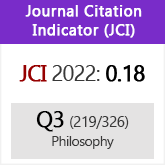Aeneas’ commitment. Virtue and radical democracy after the dialectic of Enlightenment
DOI:
https://doi.org/10.3989/isegoria.2009.i41.667Keywords:
virtue, radical democracy, Aristotle, MacIntyre, Dialectic of EnlightenmentAbstract
The aporia resulting from Horkheimer and Adorno’s critique of the Dialectic of Enlightenment has been raised after the hermeneutic turn of the tradition started by Nietzsche and Heidegger. Essentially it proposes a new Western philosophy beginning, starting from the ontological duality established by the presocratics and maintained by Aristotle against the monological reason of Plato’s teachings. Starting from a new point of view on the Nicomachean and Eudemian ethics, the author puts forward a critique of modern views on Aristotle’s virtue theory, including MacIntyre, in order to propose a new approach to connect the practice of virtue to radical democracy.
Downloads
Download data is not yet available.
Downloads
Published
2009-12-30
How to Cite
Hernández Castro, D. (2009). Aeneas’ commitment. Virtue and radical democracy after the dialectic of Enlightenment. Isegoría, (41), 137–162. https://doi.org/10.3989/isegoria.2009.i41.667
Issue
Section
Articles
License
Copyright (c) 2009 Consejo Superior de Investigaciones Científicas (CSIC)

This work is licensed under a Creative Commons Attribution 4.0 International License.
© CSIC. Manuscripts published in both the printed and online versions of this Journal are the property of Consejo Superior de Investigaciones Científicas, and quoting this source is a requirement for any partial or full reproduction.All contents of this electronic edition, except where otherwise noted, are distributed under a “Creative Commons Attribution 4.0 International” (CC BY 4.0) License. You may read here the basic information and the legal text of the license. The indication of the CC BY 4.0 License must be expressly stated in this way when necessary.
Self-archiving in repositories, personal webpages or similar, of any version other than the published by the Editor, is not allowed.














